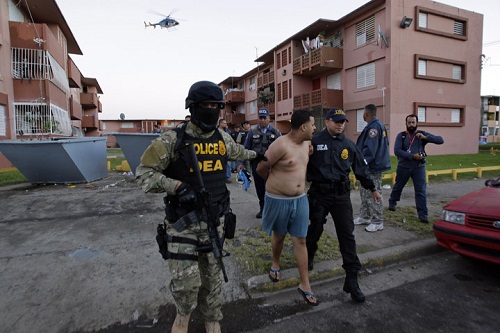AP photo
By
Ricardo Swire
Internal security is the quality of law and order within a nation. Puerto Rico (PR) is an American owned Caribbean island. Geographic positioning places it along the “Mona Passage,” a popular drugs trafficking route via the Dominican Republic. Regional intelligence data notes PR’s east coast as a favorite drop off point after island hopping St Martin, US Virgin Islands and northern Lesser Antilles.
The US Drug Enforcement Administration (DEA) registers “La Perla,” an oceanfront slum in Old San Juan, as PR’s heroin capital. Not far away is the island’s most visited landmark by tourists called El Morro. Caribbean internal security analysts evaluate that PR’s economic meltdown and downward spiral carries a mysterious overtone. In July 2017, crushed by US$74 billion debt and pension liabilities worth US$49 billion, Puerto Rico’s political overseers formally filed for the equivalent of bankruptcy protection.
More uncertainty shadows PR’s pensioners since American retirees and institutional investors are the real owners of the country’s national debt. Since 2007 job availability has declined twenty percent, while ten percent of the population migrated. PR’s floundering economy and internal security environment force Puerto Ricans to relocate to mainland America, in the largest numbers since the 1950s. According to PR’s Census Bureau statistics approximately forty percent of the departures have gone to seek work on the US mainland. Six of ten citizens are unemployed or not interested in working. Almost half the population are enrolled in Medicaid.
Puerto Rico’s politicians have reacted to the internal crisis by raising taxes, allowing government bureaucracy to balloon and borrowing money to pay unsustainable pensions. A year ago PR’s Governor declared a moratorium on US$422 million in government debt, effective May 1, 2016 at midnight. Caribbean intelligence analysts noticed several internal security peculiarities related to PR’s downward economic spiral. Two year old documented evidence shows millions of dollars stolen annually from public monies by identified PR government bureaucrats.
PR’s June 24, 2015 Legislative Report’s twenty-three pages detailed government’s conspiracy with Wall Street businesses to perpetrate a US$11 billion fraud. Additionally, a senior CIA agent based in Alexandria, Virginia inferred that PR’s high-level financial juggling appeared on the Agency’s “radar” after the Puerto Rico Electric Power Authority’s (PREPA) top boss started communicating directly with Venezuela’s President. The CIA agent specified that audio recordings of telephone calls, between PREPA’s chief and the Venezuelan President, arranged purchases of Venezuelan sludge oil fraudulently billed at high grade petroleum price.
In a Ponzi scheme type arrangement the oil sales’ principal and return amounts were three-fold exempt PR and Federal taxes. The price difference, valued US$700 million yearly, was kick-backed to the PREPA Fuel Office Manager. He subsequently rewarded participating PR politicians, government officials, PR based FBI Agents and PR’s US Attorney Office. The PREPA Manager compensated bondholders with cash received from “new investors.”
One financially impacted local business submitted a formal report to the US Federal Bureau of Investigations’ (FBI) San Juan office. Months sauntered by before senior Federal agents determined the activity “did not meet criminal standards and would better be handled as a personal civil case.” PR’s national fraud and embezzlement trail ran cold. Eventually a CIA agent telephoned the corporate whistleblower to inform him that since 2007 Agency resources had monitored all electronic money transfers exiting PR.
The CIA officer added FBI agents were notified of Agency suspicions but disregarded taking action. Digital audio recordings of related CIA conversations identify the FBI’s San Juan section and US District Attorney Office staff who participated in the enrichment scheme. British Intelligence or MI6 verified knowledge of PR’s national happenings. America holds almost all of PR’s US$74 billion debt. Yet cash has flowed out of PR and returned to locally based US Department of Justice (DOJ) employees. CIA public relations officials defend that America’s separation laws, related to CIA activity and national law enforcement, technically ties the Agency’s hands in the matter.
Ricardo Swire
Ricardo Swire is the Principal Consultant at R-L-H Security Consultants & Business Support Services and writes on a number of important issues.



No Comments Yet!
You can be first to comment this post!